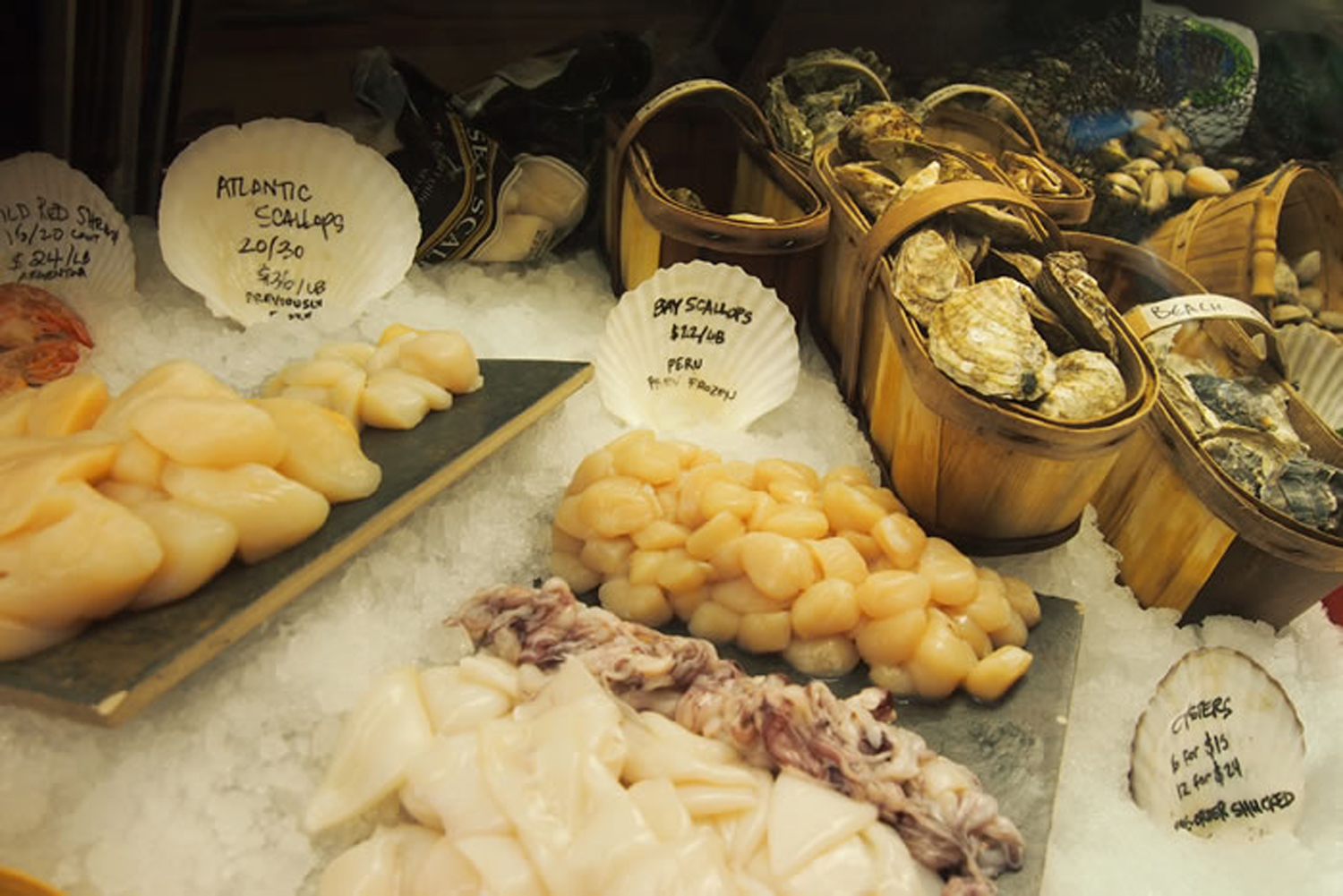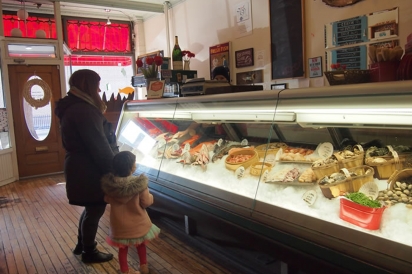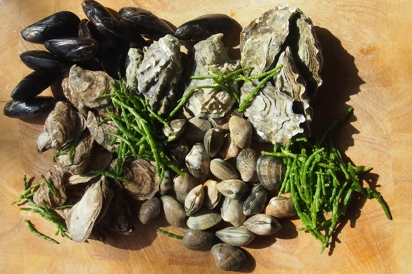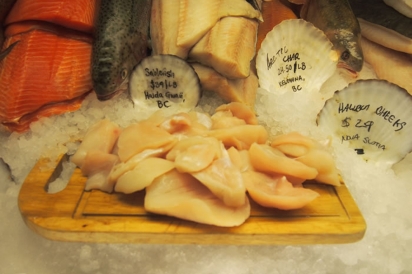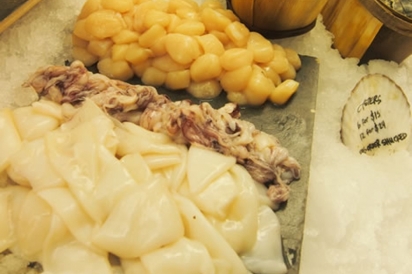Good, Clean and Fair Fish at Hooked Inc.
Hooked Inc. is a sustainable-seafood business with two Toronto locations, one on Queen Street East in Leslieville and the other on Baldwin Street in Kensington Market. It is a joint venture between Kristin Donovan and her husband Dan, who met sixteen years ago as students at the Stratford Chefs School. They both embarked on careers in restaurants and decided five years ago that it was time to take the plunge and open their own business.
Before opening Hooked, Kristin and Dan spent about a year speaking with Ontario restaurateurs to learn more about the fish industry and how they sourced their seafood products. Having themselves worked in restaurants, they were well aware that finding quality sustainable fish was hit or miss in the industry. They soon discovered that there was quite the demand for a seafood business that focuses on product traceability, product knowledge, and the sourcing of extremely fresh products. “We wanted to be able to have our own impact,” Kristin explains, “and for us that seemed to be in the world of fish.”
The two also noticed that home consumers were having a difficult time making informed decisions when it came to buying and eating seafood. Although Kristin and Dan both knew how to cook fish they, like the people they spoke with, had difficulties knowing where to purchase it. They decided they would run Hooked just like they would a restaurant: they would purchase quality fish and seafood directly from producers and would strongly support small-scale Canadian fisheries. And so, with a plan in mind, the first Hooked store opened on Queen East in 2011, followed by the Kensington store in 2012.
Kristin recalls that getting things going certainly had its challenges. Making the initial contact with the producers and fisheries was difficult at first since no one had ever heard of them. Five years down the road, however, she smiles as she points out that almost all of the products Hooked carries are, just as intended, sourced directly from producers, allowing their business to actively support small fishing communities. Moreover, they’ve also chosen to operate on the fair-trade model by enabling some of the fishers they work with to set their own prices, in turn supporting the longevity of these fishing businesses.
Being chefs themselves, Kristin and Dan know the importance of cooking with fresh ingredients. Because they source directly from the producers and small-scale fisheries, the seafood at Hooked is shipped to Ontario the same day it’s caught. The huge benefit is that they’re able to get products to their two stores five to ten days ahead of the regular supply chain. Shipments are picked up at Toronto’s Pearson Airport just about every day at five in the morning and delivered to the two stores; an occasional second delivery arrives in the afternoon. For fish and seafood, the taste and texture of which greatly depend on freshness, speed and timing are key. How often do we say that fish tastes better near the ocean? That unmatched freshness at Hooked is undeniably quite the catch.
Aside from freshness, sustainability is an area of increasing concern to consumers when it comes to seafood. Statistics on fish exploitation and overexploitation vary greatly and putting together reliable data remains a huge challenge since the methodology and statistics differ tremendously among species and regions. Nevertheless, estimated numbers for overexploitation are staggering, ranging from about 30 percent to close to 60 percent, according to the second World Ocean Review (WOR 2) report published in 2010.
The state of our global fish populations and our oceans and other water bodies has been deteriorating for decades. The dumping of trash and plastics—referred to as ocean “garbage patches”—creates huge problems for marine ecosystems, as do massive amounts of bycatch (fish and other marine species that are netted or caught alongside desired species and are then thrown overboard). Poor fisheries management and unscrupulous fish farming, private fishers who don’t respect fishing regulations, general overfishing, as well as unfair fishing arrangements that allow foreign fleets to overfish in the waters of developing countries, are all issues of great concern and it is these and others that are used to determine the sustainability of a given fish or seafood species from a given region. On top of it all, people working in fisheries around the world often face poor—or even slave-labour-like—working conditions.
Almost all of the seafood Hooked sells carries the Ocean Wise stamp of approval, meaning the products have been vetted by this Vancouver Aquarium conservation program to ensure that sustainable practices were used during harvest. Kristin and Dan also work with the Ecology Action Centre out of Halifax to source small-boat fish, as well as Monterey, California-based Seafood Watch. Kristin points out that all three organizations also have apps to help consumers decipher whether their seafood choices are approved as sustainable or are red-listed as products to avoid (or somewhere in-between).
Scanning the display case at the Queen Street store, my eyes are met with an array of colourful beings, from shiny trout with googly eyeballs to oysters that resembled mossy rocks, a slab of dark pink tuna alongside ever-so-popular in-house-smoked salmon and pinkish Arctic char, all giving off that familiar fresh fish smell I recall from my childhood near Lake Erie. A small cooler near the display fridge is filled with other items like bags of smelts and house-smoked trout. I ask Kristin what the most popular fish is and she quickly replies that it’s salmon. “But,” she says, “we encourage people to switch it up and try other types of fish.” She also points out that the staff in the stores are trained chefs who can provide cooking advice for their customers.
Most of the fish and seafood at Hooked comes from both Canadian coasts—the Pacific and the Atlantic—as well as the Great Lakes—predominantly Lake Erie—and the Georgian Bay (Lake Huron) area. The majority of the shellfish is Canadian, with the exception of wild shrimp, which comes from the Baja Peninsula in Mexico. Kristin estimates that 95 percent of the fresh products they carry are from North American sources. The stores also carry artisanal products such as bread, jams, preserves, honey, oils, and spices, with the larger Leslieville location having a bit more variety. They also sell their own in-house-made soups, fish spreads, sauces, and the like. Hooked also wholesales to restaurants and other establishments in the GTA.
Cooking classes run every Tuesday evening at their Leslieville location. The Fish Charcuterie 101 class would be taking place that night, during which participants would learn how to cure and smoke fish and make fish sausages and terrines. Other classes include Fish Cooking 101, Whole Fish Demo, Fishmongering for learning to filet whole fish, Sushi and Sashimi, and more. Private classes are also available.
Kristin and Dan are also active members of the Toronto chapters of Slow Food and Slow Fish, branches of Slow Food International, an organization headquartered in Italy that works to protect and promote regional and sustainable food production. The two are founders of Slow Fish Canada’s Toronto branch, which works to engage Canadians at all levels to find local solutions to better support the management of freshwater and marine resources.
On the day Kristin and I were chatting, Dan was actually in New Orleans at the first-ever North American Slow Fish conference, where he spoke about sustainable fishing and seafood sourcing in North America. Kristin explains that she and Dan have also been involved in international-level discussions to try to unify small-boat legislations and small fisheries around the world. “On a big scale, that’s what we do,” she says.
Slow Food and Slow Fish align well with their business, which aims to connect more people to the source of their food while supporting small, often indigenous, food producers. “Slow Fish is, like Slow Food, rooted in all things that are good, clean and fair—what we seek to do in our business every day.”
Hooked Inc.
888 Queen St. East., Toronto . (416) 828-1861
206 Baldwin St., Toronto . (416) 551-2755


